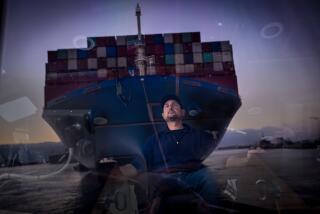Longshoremen’s Docktionary: Their Lingo Is Anchored in Past
“Hey, tell the wharfinger the gang is hard-timing us and we’ve got nothing to dray.”
The trouble at West Coast ports has thrown a spotlight on the colorful language of the docks, spiced with words that date back to the Middle Ages. Here’s a sampling:
* Drayage: noun. The hauling of goods, usually for short distances, by truck. From “dray,” a strong, low cart without sides, for carrying heavy loads. “The drayage company hauls the containers to Ontario instead of putting them on the rail cars at the dock.”
* Gang: noun. A work crew of stevedores. “Two gangs were dispatched to unload that ship.” The term had been used to refer to a set of things. It was extended to people in a nautical setting in 17th century Britain, likely from the earlier word “ging.”
* Hard-timing: verb. Carrying out a work slowdown, as in “The longshoremen are hard-timing the shipping lines.”
* Longshoreman: noun. Someone employed along the shore. From the days when most dockworkers were day laborers and recruited at the last minute by shore-side criers calling, “Men along the shore!”
* Stevedore: noun, verb. A worker employed as an overseer or laborer in loading and unloading ship cargo; the act of unloading the cargo. Used as a verb in the sentence, “The gang is going to stevedore that ship.” From the Spanish estivador, taken from estivar, “to stow”; earlier, in 13th century Latin document, written as Stivator. In 1788 Massachusetts, written as “stowadores.”
* Wharfinger: noun. An owner, keeper or overseer at a wharf or dock. From a British term of the 1550s, earlier written as “wharfager.”
Sources: Oxford English Dictionary, the International Longshore and Warehouse Union, Webster’s New World Dictionary, Random House Historical Dictionary of American Slang
More to Read
Sign up for The Wild
We’ll help you find the best places to hike, bike and run, as well as the perfect silent spots for meditation and yoga.
You may occasionally receive promotional content from the Los Angeles Times.






